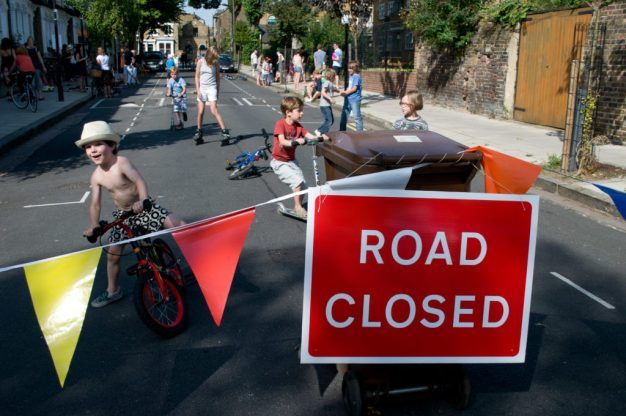
‘Playing Out’ movement goes from strength to strength
The ‘Playing Out’ movement which sees communities closing their streets to traffic and is continuing to grow has scheduled another online forum for professionals.
On Thursday 11 May at 10:00 (British Standard Time) there will be an opportunity to learn about how Play Streets is being used in cities and towns across the UK.
Organisers say that if you perhaps work for a council or community organisation and are looking for advice on how to introduce the project then is forum is for you. Or do you already have a play streets project but would like guidance on how to reach more residents? Having problems or are encountering objections in the locality?
Play Streets says that whatever your situation is, this is a great chance to join in with the quarterly meeting, done over Zoom, with a short regional case study, followed by a Q&A. This particular forum will hear from Alison Stenning, founder of play.meet.street in North Tyneside, which has supported over 100 street communities to play out regularly.
‘Protecting their right to play’
It was back in 2009 when Playing Out started out on a single street in the city of Bristol. Friends Amy and Alice were frustrated that the dangers of being on busy roads meant that local children were, unlike their own childhoods, increasingly unable to play outside. So they rounded up the neighbours and petitioned to have their streets closed off to traffic.
It was such a success that the idea began to spread, first across Bristol – the council even introduced a policy to allow streets to ‘play out’ every week – and gradually the whole of the UK and internationally. Playing Out is now a national body which passionately champions change in the long term, supporting the rights of all children to play outside.
“Our aim is for playing out near home to be a normal, everyday part of life for all children, as it once was,” says Play Streets. “This means safer, less traffic-dominated streets and more connected communities. It means children having clear permission to play out in the spaces around their homes. It means no ‘No Ball Games’ signs. It means putting children first and protecting their right to play.
“This is going to take a major shift in attitude, as well as in government policy. We’ll need to recognise the vital importance of play and freedom for children and to change the way we plan and design our streets, housing and cities. But we can also start to change things right now, in our own communities,” it adds.
Anyone interested in being added to the mailing list for information about the online forum should email lucy@playingout.net




